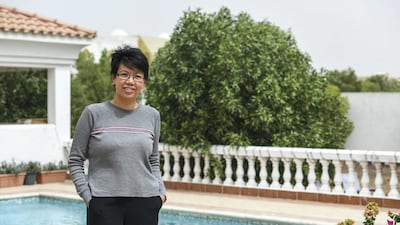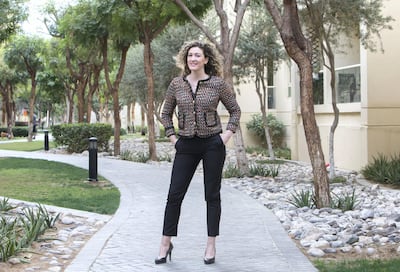When Jennifer Castro’s tenant defaulted and left the UAE owing her Dh35,000, she fortunately had enough savings banked to be confident she could still pay the mortgage.
Considering that half of all people say money matters are the biggest cause of their stress, her saving habit has given her both financial security and peace of mind.
Based in Abu Dhabi, Ms Castro, 45, a Philippines-born Australian co-ordinator, has been a lifelong saver and consequently owns both a family home in Sydney and two investment properties in the UAE. But she has had many storms to weather in recent times.
She had to take several months off work to nurse her husband when he was diagnosed with pancreatic cancer and was subsequently widowed in 2016. Last month, she reported her reneging tenant to the police, who was later stopped at the airport returning to the country and paid the rent owed to the police.
“Even though Dh35,000 was not an insignificant amount,” says Ms Castro, “in the worst case I was comfortable enough to know I could continue paying the mortgage from my own savings without having to borrow money from the bank or from friends. It gave me an uneasy feeling to submit a police case, and one or two sleepless nights, but it was not a long-term worry.”
According to a 2018 savings report from the UK financial institution Lloyd’s Bank, 46 per cent of people say money matters are their biggest source of stress, particularly for the young, with 58 per cent of people in the 25 to 34 age bracket and 59 per cent of those ages 35 to 44 saying they were anxious about their personal finances.
Yet the bank found that 74 per cent of regular savers felt happy over the month prior to being surveyed, compared to only a third of non-savers. Three-quarters also felt that the saving habit made them feel less anxious and insecure, with half saying that having a saving plan had a positive impact on their mental health.
Sebastien Aguilar, a Dubai resident who heads the non-profit investment community SimplyFI.org, says money is a "key pillar" to a "happy and fulfilled life", alongside health, relationships and well-being. Progress in any of these make your life better, he says, while deficiencies in any area can "make you suffer".
Having an emergency fund of three to six months’ worth of expenses allows savers to be prepared for unfortunate events, to have better relationships as you never have to ask for money, to take more risks and to be “more authentic and true to your values”, he says. And once you have “the capacity to take care of yourself”, savings can even help you take care of others around you or to support global causes.
Mental health counsellor Resha Erheim says money provides “a sense of safety and security” in a life filled with uncertainty, as the source of “economical survival”.
Hypnotherapist Anna Yates, the founder of Dubai’s Mind Solutions, agrees, saying that money may be the root of all evil but it is also essential for both survival and well-being. When it runs too short to meet basic needs, people start to visualise worse-case scenarios, she says, such as losing respect and social status, not being able to support a family and even homelessness and starvation.
The mind then releases hormones to “enable us to fight, flee or freeze”, which causes “confusion in our minds and bodies, and mayhem with our sleep and health”. Putting a plan in place will “mentally reassure our subconscious mind that all is fine”.
That has certainly been the case for Sorcha Coyle, 32, an Irish teacher who has lived in Dubai for three years and in the Gulf for seven. She says it was seeing her father lose his job in construction during the recession, just after buying an investment property, and watching her mother struggle to pay two mortgages on a teacher’s salary that spurred her on to save.
She set a goal of €100,000 (Dh412,554) and broke it down into annual, monthly and weekly goals. She has now bought two properties, a four-bedroom house in Ireland she bought for cash and a three-bedroom apartment in Spain. She already rents the Irish house out and plans to renovate the Spanish apartment this summer and rent it out too. She has also sent money home to help her parents out. She recently set up a Facebook community, Empowering Expat Teachers, to help other teachers with their finances.
“Even if everything goes to rack and ruin,” she says, “I’ll always have somewhere to live and never have a mortgage I couldn’t pay off. If I were to lose my job, I’d also have a source of income every month. I never want to feel that money has control over me, that I’m massively indebted to an institution. I’m in control of money.”
David Hanson, who writes the blog Dubai Money Guy, found himself in debt after he left university, when earning very little in his twenties. "My experience of anxiety and depression is that they have no respect for wealth or position," he says. "However, any activity that creates order and stability and builds self-worth, along with net worth, can only have a positive impact."
He does say about large investments, though, that “increasingly large stakes” can put a lot of pressure on people struggling with anxiety, “especially as money is something that people don’t feel comfortable talking about".
Steve Cronin, the founder of DeadSimpleSaving.com, an independent community for financial education in the UAE, warns that savers must ensure they weigh up their target net worth (total assets minus liabilities) against their target monthly savings plus their "current happiness". "There is no point in saving 70 per cent of your income if you are living on Pot Noodles and feeling miserable," he says.
But the mentality of saving – that is, saying no to short-term pleasures for a greater long-term gain – gives people the mental discipline that makes them more resilient in tough times, he says, and helps them make better choices and fewer impulsive decisions.
Ms Castro says it was living modestly and having emergency savings that helped her to stay afloat when disaster struck, even though her husband was the main breadwinner. “For me it’s important to put aside money for insurance, savings, investments and expenses: 5 per cent, 15 per cent, 20 per cent and 60 per cent [for each] is prescribed,” she says.
She adds that her and her spouse had “a good buffer and good insurance”, so they did not eat into their emergency savings. “That’s when people fall into a trap and get into debt – when they have no savings” she warns. “Money problems cause stress: people get sick over this.”


